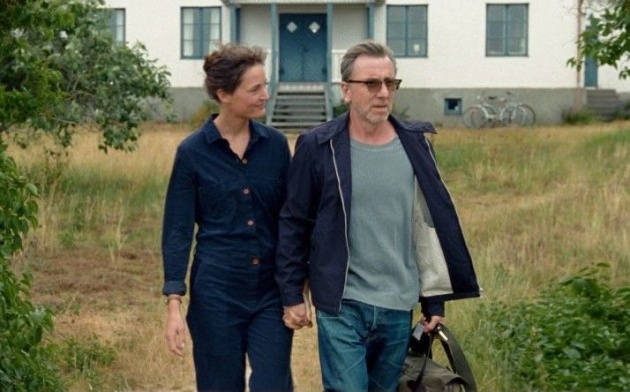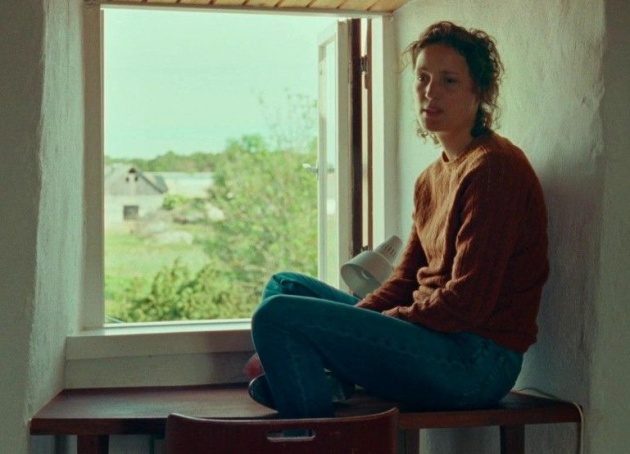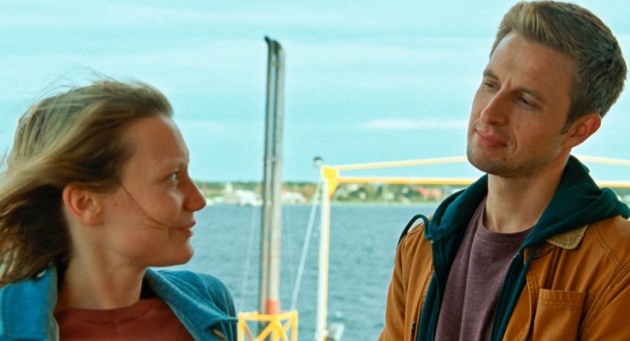
Pictured: Chris (Vicky Krieps) and Tony (Tim Roth) in a scene from the marital meta-drama, 'Bergman Island', a Sweden-set film in English written and directed by Mia Hansen-Løve. Still courtesy of IFC Films (US) / Mubi (UK)
I confess I arrived late to an appreciation of French director Mia Hansen-Løve. Up until Bergman Island, her first predominantly English language film, I had not attuned myself to her low-key style of storytelling evident in such films as All is Forgiven, Eden and Things to Come.
However, before watching Bergman Island, I hadn’t seen a film for ten days. It took the cleansing of my cinematic palate to surrender myself to a film that even by the standards of ‘arthouse’ cinema is slow and low stakes – at least to begin with.
I knew I was going to have a good time when a satellite navigation system announced to its passengers, the filmmaking couple of Tony (Tim Roth) and Chris (Vicky Krieps), ‘you will reach your destination in one hour and forty-eight minutes’, which, broadly speaking is the running time of the film.
The title sequence of Bergman Island consists of words typed on a white screen in a font similar to ‘Engravers MT’, complete with spelling corrections, with the white of a page merging into clouds through which we see a small aeroplane heading towards land. Inside, Tony is nursing Chris’s head as she covers her eyes with a scarf. It is fair to say that she doesn’t like flying. Tony is a picture of calm and three-day-old stubble, a no-longer young Englishman who is travelling to the Swedish island of Fårö, where famed Swedish film and theatre director Ingmar Bergman (1918-2007) settled in the 1970s with his sixth wife, Ingrid von Rosen. A simple headstone marks their burial site. The occupants of Fårö appear mostly unhappy with Bergman tourism, though part of his estate, but not the house where he lived, is available for artistic retreats - much like Prospect Cottage, the final residence of the late British director, Derek Jarman.
Tony and Chris have come to Fårö to work. Tony has a re-write to complete and faces a potential delay. ‘You realise you’ll lose half the cast,’ he advises his producer during a phone call. Tony isn’t under pressure. He’s used to the process. Chris though is more anxious. Working in Bergman’s shadow makes her feel inadequate. Tony tells her that she’s not under pressure to produce Persona. ’Thank God,’ replies Chris. While Tony finds a spot to work in the house where Bergman shot Scenes from a Marriage – a film that inspired millions to divorce, we are told twice – Chris settles in a windmill. Her window faces his. Both use fountain pens and write in notebooks rather than use keyboards.
There is an ironic juxtaposition between the instructions of the satellite navigation system, that tells the couple to turn in 100 yards and turn again and the straight road that they follow. This is the first indication that all is not what it seems or to put it another way, the [female] guiding voice is talking nonsense. At one point, a character remarks, ‘just because Bergman said it was a trilogy doesn’t mean that it is [one]’. Another character (in Chris’ outline) attending a wedding will argue that her white dress is off white or beige. ‘Well, is it white, or isn’t it?’ the bride-to-be asks. Lest we forget, the art of fiction is to will falsehood into being.
How low stakes is Bergman Island? On the ferry to Fårö, Chris remarks that she left her sunglasses at the airport. Tony lends her his own. Later, Chris will spend 800 Swedish Kroner (about 100 USD) to buy a pair of sunglasses modelled by Bibi Andersson in a still from a Bergman film. A student filmmaker, Hampus (Hampus Nordensen) notices her. He invites her for an alternative tour of Fårö, in contrast to the so-called ‘Bergman Safari’ that Tony has agreed to join. Chris stands up her partner and joins Hampus for a trip to the dunes. They go into the water and throw jellyfish at one another. Finally, Hampus takes her to a vendor of lambskins – Chris buys two. Tony is extremely irritated at being stood up. In a text message exchange, Chris explains that she didn’t want to wait for Tony’s question and answer session to end. ‘How did it go?’ she asks him belatedly. ‘Pretty good,’ replies Tony casually. From the one clip we see, Tony makes tacky thrillers, one in which the heroine stabs the man following her in the chest. I was reminded of the work of British director, Anthony Waller, who made a strong impression with his debut, Mute Witness, but made the ill-advised sequel, An American Werewolf in Paris with Julie Delpy in 1997 and faded into obscurity. It would be hard to imagine Waller being thought of as a serious artist as Tony is here. That said, Bergman’s work is likened by Chris to a horror movie with none of the relief. ‘We watch horror films knowing they are not real. We do not have that certainty with Bergman.’ At a question-and-answer session, Tony talks about women being central to his films; we understand why Chris feels uncomfortable.
The first half of the film is dominated by men. In an early scene, Chris trails behind the group as they are invited inside a restaurant. Tony is the centre of attention – one of the group who greets him is Stig Björkman, the director of an Ingmar Bergman documentary, But Film is My Mistress, playing himself. Before going inside, Chris picks up her near-empty glass of red wine and drinks the remaining contents, a gesture that can be read as an act of fortification of the tedium to come or a protest that no one is really interested in her.

Pictured: A writer in her room. Chris (Vicky Krieps) in a scene from the relationship meta-drama, 'Bergman Islamd', written and directed by Mia Hansen-Løve. Still courtesy of IFC Films (US) / Mubi (UK)
Chris struggles with her writing literally when her fountain pen runs out of ink. Having said goodbye to Tony earlier that day, she wanders into his workspace and looks at his notebook. He is working on a project entitled ‘F’. Looking at the pages he has written – with none of her corrections – she is drawing to the sexually-explicit doodles on various pages. Yet when she tries to interest Tony in sex, having unbuttoned her blouse and stood close to him while he was at his desk, he doesn’t respond. This is the heaviest indication yet that, though they share the same bed – Chris refuses the option of separate bedrooms – their relationship is already in trouble.
Chris has another source of anxiety – the absence of her daughter, June (Grace Delrue), being looked after by Chris’ mother. Chris is anxious for news, but her mother does not answer the phone. Later, Tony shows Chris a video of June. ‘Why did she send it to you and not to me?’ she asks. ‘I’m her favourite,’ Tony replies wolfishly. As the film progresses, we understand exactly why Chris’ mother treats her in a frosty manner.
In spite of the lamb burger eaten at the end of the ‘Bergman Safari’ leaving Tony a little queasy, he listens to Chris’ outline. Her idea is called ‘The White Dress’. We then watch the visualisation of Chris’ story. Amy (Mia Wasikowska) is Chris’ protagonist. It is significant that Amy travels to Fårö not by air – which, of course, made Chris uncomfortable – but instead by boat. She is there to attend the wedding of a friend, Nicolette (Clara Strauch).
Amy knows that at the wedding she will reconnect with her former lover, Joseph (Anders Danielsen Lie). She searches for him. Joseph has moved on emotionally. He is settled in another relationship. However, he is open to Amy’s renewed attention. She has a second anxiety. The dress that she has chosen to wear at her friend’s wedding is white. It is an act of disrespect, potentially bringing the bride bad luck. Actually, Amy isn’t sure whether her dress is white – or at least, that’s what she tells others. She has a latent capacity to disrupt but does so without appearing to act out of spite.
Eventually, Amy and Joseph kiss. One of them says words to the effect of ‘is that all you’ve got?’ They continue kissing.

Pictured: Amy (Mia Wasikowska) and Joseph (Anders Danielsen Lie) in a scene from the relationship meta-drama, 'Bergman Island', written and directed by Mia Hansen-Løve. Still courtesy of IFC Films (US) / Mubi (UK)
Amy herself is torn. In one scene, she is with Joseph outside but hears Abba’s ‘The Winner Takes It All’ being played inside. She rushes onto the dance floor to enjoy the song. Joseph watches her briefly then leaves. When Amy notices that he’s gone, she goes outside to find him.
Of course, they reconnect. Joseph and Amy make love. However, he has no intention of ending his present relationship. Amy remarks that she loves two people. Is that so wrong?
Chris’ problem is that she doesn’t have an ending. She asks Tony for advice. He closes her down. ‘No, you can’t ask me that. I can’t help.’ It is only then that we realise that ‘The White Dress’ represents an infidelity Chris has herself committed, a tension she feels in her own life. We understand too why her mother disapproves.
In the last part of the film we see Chris interacting with Mia Wasikowska and Anders Danielsen Lee playing versions of themselves. There is a scene at ‘Albatross’, the estate of small wooden houses acting as homes to the cast and crew. We also see Chris visiting Bergman’s house and speaking to Hampus again, whom we suspect may be her lover. Hampus shows her the model of the Stockholm Theatre where Bergman worked. In the final scene, Tony brings June to be reunited with her mother. Chris opens up her arms to embrace the child.
Portraying relationships without violent confrontations – and depriving the audience of melodrama – Hansen-Løve creates a very distinct aesthetic, one in which emotions aren’t entirely understood by the individuals experiencing them. Writing as catharsis only gets you so far - you end up fictionalising and essentially betraying your emotions.
Lest Bergman Island seem an unrewarding 113 minutes in the cinema, it offers numerous pleasures. At one point, Chris and Tony visit Bergman’s screening room. They struggle to pick a film to watch. The seen-it-all-before projectionist is irritated and bored. They opt for Saraband, Bergman’s sequel to Scenes from a Marriage. However, a print isn’t available. Instead, they watch Cries and Whispers. The projectionist is insistent. ‘You can sit in any seat, except the one in the middle of the front row. That’s Bergman’s seat.’ Once the projectionist is out of sight, Tony and Chris rush to Bergman’s seat like giggling school children. We cheer their misbehaviour.
Bergman’s legacy is relative. In the second half of the film, Chris sets out on a bicycle in search of the house in Through A Glass Darkly. She asks some strangers who stare at her with irritation. ‘I don’t speak English,’ a woman replies. This bears out a comment early on by the housekeeper that locals won’t help you. ‘There isn’t a house,’ Tony tells her later. They built the front of it and the rest was filmed in the studio. ‘Bergman Safari,’ he teases her.
The film offers a discourse on the struggle to balance life and art. Bergman had six wives and sired nine children. ‘Do you think he could have made fifty films and staged so many plays if women weren’t there to raise the children?’ someone asks. Chris similarly finds it difficult to reconcile motherly responsibilities with the desire to create films and relies on her mother to help. In one scene between Joseph and Amy, Hansen-Løve mocks the director’s insistence on his own misery, Joseph scolding Bergman. He [Bergman] didn’t even serve in the army in World War Two. Besides, Sweden was neutral. Bergman is mocked for not lightening up, though as Tony remarks, Fanny and Alexander shows his lighter side. Almost as a reaction to Bergman, Hansen-Løve doesn’t insist that her cinema is important and dramatic. She portrays instincts and aftermaths – stimulus and response without self-important pronouncements.
My immediate response to seeing Bergman Island is to want to watch all Hansen-Løve’s other films to find out whether she uses the absence of melodrama in interesting ways. It is definitely a gateway movie: a film you watch to better understand the director’s other work. The film also makes good use of Tina Charles’ club anthem, ‘I Love to Love’, a song that gets my generation onto the dancefloor with flailing, uncoordinated but thoroughly rapturous moves.
Reviewed at Ashford Picturehouse, Screen Four, Kent, South-East England, Saturday 4 June 2022, 19:30 screening



